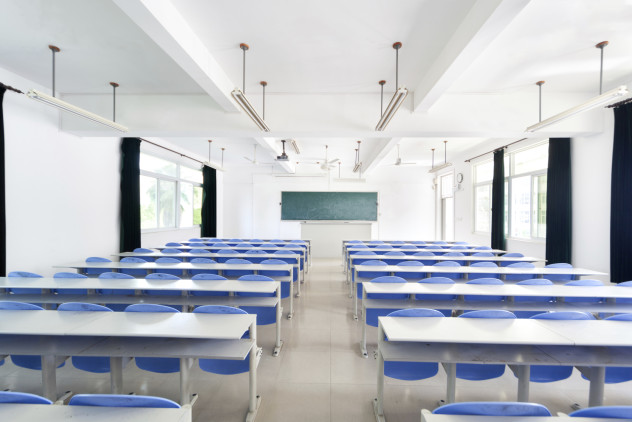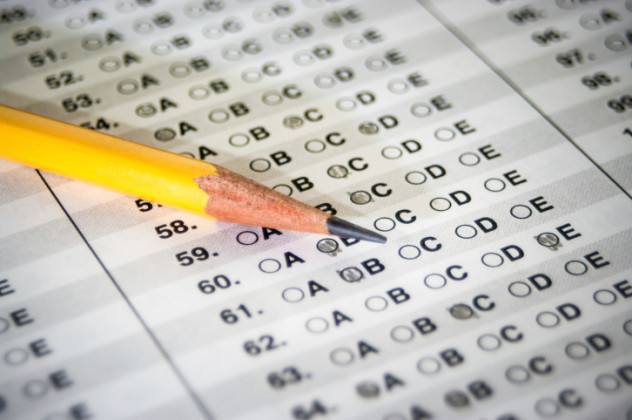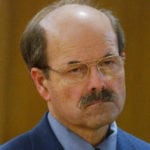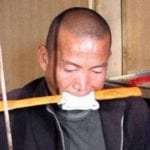 Creepy
Creepy  Creepy
Creepy  Movies and TV
Movies and TV 10 Movies That Get Elite Jobs Right, According to Experts
 Weird Stuff
Weird Stuff 10 Times Real Laws Were Based on Bizarre Hypotheticals
 Animals
Animals 10 Inspiring Tales of Horses Being Human
 Mysteries
Mysteries Top 10 Haunting Facts About the Ghost Ship MV Alta
 History
History 10 Surprising Stories About the Texas Rangers
 Humans
Humans 10 Philosophers Who Were Driven Mad by Their Own Theories
 Miscellaneous
Miscellaneous 10 Video-Game-Worthy Weapons and Armors from History
 Weird Stuff
Weird Stuff 10 Psychics Who Accurately Predicted Wartime Events
 The Arts
The Arts 10 Pieces of Art Inspired by a Broken Heart
 Creepy
Creepy 10 Death Superstitions That Will Give You the Creeps
 Movies and TV
Movies and TV 10 Movies That Get Elite Jobs Right, According to Experts
 Weird Stuff
Weird Stuff 10 Times Real Laws Were Based on Bizarre Hypotheticals
Who's Behind Listverse?

Jamie Frater
Head Editor
Jamie founded Listverse due to an insatiable desire to share fascinating, obscure, and bizarre facts. He has been a guest speaker on numerous national radio and television stations and is a five time published author.
More About Us Animals
Animals 10 Inspiring Tales of Horses Being Human
 Mysteries
Mysteries Top 10 Haunting Facts About the Ghost Ship MV Alta
 History
History 10 Surprising Stories About the Texas Rangers
 Humans
Humans 10 Philosophers Who Were Driven Mad by Their Own Theories
 Miscellaneous
Miscellaneous 10 Video-Game-Worthy Weapons and Armors from History
 Weird Stuff
Weird Stuff 10 Psychics Who Accurately Predicted Wartime Events
 The Arts
The Arts 10 Pieces of Art Inspired by a Broken Heart
10 Incorrigible Cases Of Teacher-Assisted Cheating
To describe the modern world as uber competitive would be a laughable understatement. With success and social status measured in everything from wealth to Facebook likes, the urgency to outshine others has a stranglehold on society. And, as the very technological advances that make the modern world threaten to render its workforce obsolete, it’s no wonder that students hoping to attain economic security at home or abroad might feel tempted to cheat their way to prosperity.
But, in a more tragic and troubling trend, the teachers and school administrators charged with setting young learners on the right path are also succumbing to the urge to help their students cheat as a means of ensuring money, job security, or institutional accolades. Sometimes their ploys are so staggeringly bold and widespread that they’re impossible to ignore. Here are 10 incredible cases where educators and school officials in the US and around the world have navigated the minefield of ethical temptation by seeking out the biggest explosives.
10The University Of North Carolina Enrolled Athletes In Fake Classes For 18 Years

Universities with large programs have long been criticized for applying underhanded methods to keep their athletes academically eligible. But the University of North Carolina (UNC), the alma mater of basketball legend Michael Jordan and other Olympic-caliber sportsmen, enjoyed a solid reputation for nurturing the intellectual and physical development of its athletes. However, that image collapsed under crushing ignominy when it was revealed that UNC had been enrolling its athletes in bogus classes for 18 years.
The epicenter of the academic fraud was UNC’s department of African American Studies, where at least 3,100 student athletes from various sports partook in so-called “paper classes,” wherein the entirety of an enrollee’s grade was determined by one leniently graded assignment. The system began as a labor of pity devised by Debbie Crowder, assistant to African American Studies chair Julius Nyang’oro.
Apparently overwhelmed by sympathy for struggling athletes—some of whom read on an elementary school level according to one whistle-blower—Crowder resolved that the best way to keep them afloat was simply to fake their classes. The department chair agreed and, for nearly 20 years, this was the preferred method of keeping students eligible to play sports.
Initially, UNC attempted to let the blame rest solely with department chair Nyang’oro, but over the course of a five-year investigation, coaches, academic advisers, and other officials were ensnared in a net of alleged complicity. In light of the evidence, the university chancellor was forced to admit a larger nexus of wrongdoing, leading to the firing of four employees and disciplinary measures against an additional five. One can only hope that the contrition publicly expressed by the university’s leadership amid the resulting media hullabaloo was more real than the classes its athletes took.
9Columbus Public Schools Electronically Edited Their Problems Away

While sham classes may have been a slam dunk for institutions like UNC, officials at secondary schools might feel forced to resort to subtler forms of faking. Administrators at Columbus, Ohio public schools, for example, relied on data center employees who opted to alter students’ grades on an enormous scale and sometimes to fabricate entire students.
The principals and other employees involved weren’t looking for money. They simply wanted higher marks on statewide school report cards than their schools deserved, which, appropriately enough, was achieved by giving students higher grades than they earned. At least half a million student absences were erased from attendance records, and more than 7,000 class grades were altered behind teachers’ backs, normally to turn failing marks into passing ones. Some of the students involved had already graduated, but were electronically revived as “zombie students” to help bolster a particular school’s performance stats. Others were simply given credit for courses they never completed or were withdrawn from the roster. All were cheated in the process, forced to advance through school regardless of preparedness.
Worse yet, as far back as 2004, conscientious data center employees attempted to warn then-Superintendent Gene Harris about the fraud. Their reward for honesty was dismissive silence or the threat of punishment from the data center manager if they continued pursuing the matter. The case was ultimately blown wide open by a 2012 report by the Columbus Dispatch. This attracted the probing eyes of state auditor Dave Yost, who investigated the claims of fraud. In the aftermath, Superintendent Harris resigned before the investigation was over, and more than a dozen employees were axed or voluntarily resigned. But, from their desperate lying, it was clear they had given up on their jobs long before losing them.
8Philadelphia’s Elementary School Teachers Helped Students Embrace Cheating

The sad consensus about Philadelphia’s education system is that it’s plagued by scandal and on the precipice of failure. And that’s in large part thanks to schools like Cayuga Elementary, where deception was rampant and devoid of pretense. Rather than design easy classes or resort to electronic subterfuge, several misguided teachers, along with the school’s principal, collaborated to correct students’ wrong answers on standardized tests, even going so far as to inform pupils of their mistakes mid-test and encourage cheating over the school intercom.
Cayuga’s faculty was at a loss for what to do about substandard test performances from the student body. With some of Cayuga’s students barely able to even read or write in English, Principal Evelyn Cortez, with the aid of the test coordinator and several willing instructors, illegally obtained copies of standardized test booklets before scheduled exams. With foreknowledge of exam contents, the teachers received Cortez’s blessing to feed test takers the right answers. When that wasn’t enough, a group of teachers would meet with Cortez on weekends and fill in the correct answers. And they weren’t remotely close to being alone in their misdeeds.
A 2012 assessment of 53 public schools and three charter programs uncovered “strong evidence” of academic fraud. In one case, the test scores were so suspicious that the chances of no wrongdoing having occurred were estimated at less than a million to one. In the mad dash to prevent schools from losing accreditation by inflating test scores, a total of 138 teachers appear to have traded their scruples for the chance to keep their schools afloat. Unfortunately, with test scores trumping teaching, students are still being left to sink.
7Atlanta Teachers And Principals Perpetrated One Of The Biggest Cheating Operations In US History

On the scale of school scandals, it’s pretty difficult to outdo 18 years of deception or instructing educators to cheat while young pupils sit within earshot. But instructors and administrators at Atlanta public schools kept themselves in the running. There, a bevy of nearly 180 educators were accused of throwing cheating parties and altering test sheets in one of the largest known cases of standardized testing misconduct ever recorded in the US.
At the helm of the scandal was 40-year education veteran and 2009 School Superintendent of the Year Dr. Beverly Hall, who is believed to have encouraged teachers to trick their way to high marks and financial bonuses awarded to high-performing schools. During Dr. Hall’s tenure, over which Atlanta schools’ standardized test scores improved dramatically and graduation rates doubled, scholarship money set aside for Atlanta’s students surged from $9 million to $129 million, an increase of over over 1,300 percent.
Initially, the drastic improvements in Atlanta schools were chocked up to excellent leadership, until a disproportionately high number of erasures and corrections were uncovered on standardized test responses in 2009. Digging deeper, investigators found that at least 178 school officials across at least 44 schools had engaged in widespread and systematic test corrections that stretch back as far as 2001. Despite the hundreds of actors involved, ultimately only 12 have been brought to trial.
6The Program That Inspired ‘No Child Left Behind’ Was A Paragon Of Academic Dishonesty

Since its 2002 implementation, the mandates of No Child Left Behind, which makes school funding and accreditation dependent on standardized test performance, have been impugned for imposing a rigid and limited learning rubric for public school students. It’s often one of the hotbeds of discussion when a massive cheating scandal emerges. But few people likely recall that the policy itself was inspired by a learning program that turned out to be utterly fraudulent.
In the 1990s, when Texas governor George W. Bush was pushing an accountability driven educational initiative that became the basis for No Child Left Behind, he looked to Houston’s own Wesley Elementary School. A school largely populated by underprivileged students, Wesley was then implementing an experimental reading program touted as a key to improving standardized test performance. And, for years, that appeared to be true. Wesley’s astronomical progress with reading scores made it a nationally acclaimed underdog story so inspirational that it was featured on the Oprah Winfrey Show.
Unfortunately, Wesley was one of 400 Texas schools accused of engaging in extensive cheating. Not only had the students allegedly not earned their accolades but, a year after graduating from Wesley, their test scores in reading and math dropped from the top 10 percent in the state to the bottom 10 percent. Unfortunately, the model for future President Bush’s accountability plan was steeped in a culture of cheating so brazen that, according to one former Wesley teacher, she was advised by other instructors to give out answers during tests.
The scandal that ultimately disgraced Wesley was uncovered in 2005, three years after the No Child Left behind Act was signed into law.
5India’s Upsurge In Cheating

The catalog of academic corruption in the US often tells a story of teacher-assisted student cheating as the last recourse of desperate educators whose schools are hampered by inadequate funding and the threat of oblivion created by need-blind testing requirements. But India, which is praised for the strength of its academics, has seen a sharp rise in academic misconduct by students and teachers in recent years, sometimes in the most highly esteemed schools in the country. And, according to some, the dynamic is driven by a 2010 law which protects underperforming students, rather than condemning the schools they attend.
The law stipulates that students must receive schooling at least until age 14, but cannot be held back in school before the eighth grade. As a result, students who have never known failure are more inclined to cheat when the work proves too difficult. It’s a plausible explanation. But it also glosses over the fact that teachers have a large stake in their students performing well, creating an incentive to ignore or encourage cheating.
A 2012 report about cheating on India’s standardized tests found that 250 school superintendents and 70 exam proctors helped facilitate cheating in at least 30 test centers, sometimes in exchange for bribes. And the bulk of those instances occurred in private schools, whose profitability would no doubt hinge on the promise of high test scores.
But sometimes the cases are far more extreme and tragic than unfairly giving someone a leg up in life. In one case, the principal was allegedly selling exam answers for a prohibitively high $100, driving one student to commit suicide by self-immolation when he couldn’t afford it. In other cases, teachers have been caught by school inspectors writing exam answers on the board during study sessions or throwing evidence of their cheating out of a window. India’s cheating problem has apparently gotten so bad that some schools have installed cameras. Indeed, for many students and their abetting instructors, success is a far greater muse than honesty.
4A Top UK University Is Undone By Dubious Ties
 “Goreu Awen Gwirionedd” is a Welsh phrase which translates to, “The best inspiration is the truth,” and, for over a century, it was the motto of the University of Wales (UoW). The second-largest university in Wales, its chancellor was none other than the Prince of Wales himself, whose name added prestige to a school which itself helped bolster the reputations of another 130 affiliate schools around the world. But, thanks to a series of scandals which sullied that prestige, the University of Wales no longer exists.
“Goreu Awen Gwirionedd” is a Welsh phrase which translates to, “The best inspiration is the truth,” and, for over a century, it was the motto of the University of Wales (UoW). The second-largest university in Wales, its chancellor was none other than the Prince of Wales himself, whose name added prestige to a school which itself helped bolster the reputations of another 130 affiliate schools around the world. But, thanks to a series of scandals which sullied that prestige, the University of Wales no longer exists.
The university’s undoing began in 2010 when it was discovered that UoW had lent its seal of approval to a Malaysian university headed by a pop star with fake credentials. In 2011, a much bigger bomb hit: The Rayat College of London, another one of UoW’s other partner schools, had been selling exam answers to foreign students hoping to obtain student work visas. Further investigations into the university’s other dealings suggested that the school may have turned a blind eye to the untoward dealings of a number of its overseas affiliates, including the Bangkok-based Accademia Italiana, which was also flagged for illegal activity.
Essentially, one of Wales’ oldest and best-known schools had been lending credibility to the incredibly illegal practices of other schools. In response, the vice-chancellors of other universities decided enough was enough and sought to have the institution disbanded. The result was the merger of UoW with the much older (and still trusted) Trinity Saint David, which we suspect will be much more cautious about the company it keeps.
3UK Teachers Have Been Caught Engaging In Cheating Seminars

Between the ages of 14–16, most UK-based pupils subject themselves to a battery of aptitude tests in subjects like math, English, and science in hopes of earning a General Certificate of Secondary Education (GCSE). While technically not mandatory, GCSE provides important diagnostics in the eyes of employers and universities, making the tests a veritable fast lane or roadblock to future life success.
But, in 2011, the GCSE became another academic black eye for Wales when members of a Welsh exam board were essentially caught instructing teachers with advice on how to help students cheat on the GCSEs.
As it turns out, students are not the only people who prepare for GCSE exams. Various exam boards, hoping to be chosen by a school to run one or more of its GCSE exams, offer expensive seminars which give teachers testing tips and peddle exam board–endorsed textbooks and other study material.
Over the course of attending and filming 13 different GCSE seminars, The Daily Telegraph found that the tips being doled out by the increasingly popular Welsh exam board (WJEC) were essentially lessons in dishonesty. Examiners leading these seminars described which topics, questions—and sometimes even keywords—would appear on coming GCSE exams. For the price of £120–£230, teachers could essentially give their students inside information.
After revelations of cheating emerged, the WJEC suspended two of its examiners. But, troublingly, the board defended itself by explaining that its unethical advice has been the accepted practice among schools for years.
2Widespread Cheating Got The SATs Canceled For The Entire Country Of South Korea

Every year, hundreds of thousands of international students hunker down in front of a desk, sweating bullets and attempting to outdo similarly situated students from 175 countries around the world on a test that could determine their job prospects for a lifetime. We’re speaking, of course, about the SAT exam which, for the best performers from around the world, opens doors to American universities that rank among the best in the world. But, in 2013, South Korea encountered a rash of cheating so widespread that the SATs were canceled for the entire country.
At the core of the scandal is a staple of South Korean test prep known as the “Hakwon,” a center where many students engage in cramming for tests and receive illicit information about the contents of the SATs. Apparently, for a fee of approximately $4,575, a family can buy an entire SAT test booklet for a child aspiring to study in the US. Many see this fee as worth the risk.
And, while South Korea has seen mass cheating in the past, the 2013 debacle marked the first time in history that the test has been voided for an entire country, which is an unenviable testament to both the ambitious dishonesty of the students involved and to the sheer desperation of foreign students to obtain an American education.
Luckily, but also expensively, for some of South Korea’s high-achieving students, the test cancellation didn’t completely spell the end of their American dreams. A number of students went as far as traveling to other countries to take the exam, demonstrating just how costly it truly can be when bad apples spoil the bunch.
1Russia’s Virulent Corruption Infects Med Schools In A Big Way

In 2011, the Russian National Pirigov Research Medical University entered the annals of educational disgrace when a whistle-blower revealed that 503 of the institution’s 709 seats were surreptitiously filled with ineligible students. To perpetrate the ruse, university rector Nikolai Volodin invented high-achieving students to occupy government-funded slots on the school’s roster before selling their spots to people with glummer academic resumes. Worse yet, this brand of deception was only the tip of an overwhelming iceberg.
As shocking as it might be for us to imagine a medical school where 75 percent of the enrolled students are frauds, according to a survey of 17,500 Russians, this level of deception is par for the course, with higher education ranked as the second most corrupt sector of society. Medical school students interviewed on the subject admitted that flagrant bribery is common among students struggling to stay afloat, with some paying off their instructors in front of other pupils.
Adding to the bleakness of the dynamic is the reality that honesty may only benefit the brightest students. Academically overwhelmed students who pay for extra classes find themselves forced into the unenviable position of paying inflated fees for insufficient or nonexistent assistance. That leaves failure or fiendishness as the only viable options for many students looking for a return on their educational investment. The cost for society, however, will likely be far starker.








